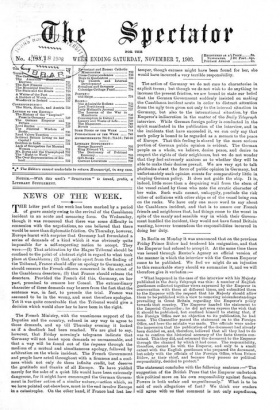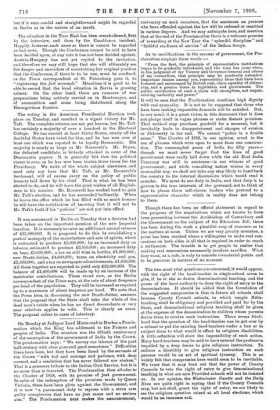In Berlin on Monday it was announced that on the
previous Friday Prince Billow had tendered his resignation, and that the Emperor had refused to accept it. At the same time there was issued through Reuter's Agency an official version of the manner in which the interview with the German Emperor came to be published. We feel we might do an injustice to this remarkable story should we summarise it, and we will therefore give it verbatim :—
" What happened in the case of the interview with his 31‘jesty published in the Daily Telegraph was this : A. number of English gentlemen collected together views expressed by the Emperor in conversation with them at different times, and submitted them to the Emperor with the request that his Majesty should allow them to be published with a view to removing misunderstandings prevailing in Great Britain regarding the Emperor's policy towards that country. The Emperor handed the statement to the Imperial Chancellor ; he did not even express the wish that it should bo published, but confined himself to stating that, if the Foreign Office saw no objection to its publication, he had none. The Chancellor passed the statement on to the Foreign Office, and here the mistake was made. The officials were under the impression that the publication of the document had already been decided on, and, therefore, believed that all they had to do was to confirm the historical accuracy of the facts therein con- tained. This they did, and returned the document to the Emperor through the channel by which it had come. The responsibility, therefore, cannot lie with the Emperor, and only to a small extent with the English gentlemen who prepared the document, but solely with the officials of the Foreign Office, whom Prince Billow, as their chief, and because they possess no political responsibility, decided to protect."
The statement concludes with the following sentence :—" The suggestion of the British Press that the Emperor undertook this political move on his own responsibility against foreign Powers is both unfair and ungentlemanly." What is to be said of such allegations of fact ? We think our readers will agree with us that comment is not only superfluous,
but if it were candid and straightforward might be regarded in Berlin as in the nature of an insult.





























































 Previous page
Previous page